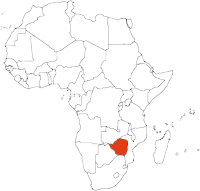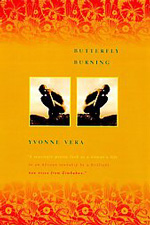
 Readers beware: if you prefer a conventional or chronological narrative structure, you may struggle to comprehend Butterfly Burning.
On the other hand, if you are willing to be patient, it is possible to reach out and almost touch the cloud of poetic language
that Vera uses. Butterfly Burning has lingered in my memories for days, where elements of the lightly connected story start
to come together.
Readers beware: if you prefer a conventional or chronological narrative structure, you may struggle to comprehend Butterfly Burning.
On the other hand, if you are willing to be patient, it is possible to reach out and almost touch the cloud of poetic language
that Vera uses. Butterfly Burning has lingered in my memories for days, where elements of the lightly connected story start
to come together.
Yvonne Vera has created a microcosm in a slum street in Bulawayo, Zimbabwe in the mid-1940s to 1950 that encircles the life of Phephelaphi, a young woman trying to find her place in the world. Butterfly Burning follows Phephelaphi's experiences in ever decreasing circles as she struggles to reconcile her dreams with the reality of life for an African woman who fights to control her destiny.
Around Phephelaphi swarms a cast of slum inhabitants; some are unnamed, such as the men who work themselves to death in the countryside to subsist: 'The work is not their own: it is summoned. The time is not theirs: it is seized. The ordeal is their own. They work again and again, and in unguarded moments of hunger and surprise, they mistake their fate for fortune'.
Vera explores some serious themes in Butterfly Burning: the subjugation and discrimination of the black population by the white British colonisers, the powerlessness or seeming powerlessness of women, and the grinding poverty of life in a slum. Juxtaposed against the harsh realities of this life is the beautiful language that Vera uses, reminding the reader that there is beauty in poverty, beauty still in hardship and struggle, and beauty in pain.
In a lament to the lost identities of women from the rural villages, Vera writes:
Butterfly Burning is a celebration of African women, of their courage and ingenuity in the face of adversity.

Farrar, Straus & Giroux, paperback, 0374291860